How to Sleep Better: 15 Tips for Quality and Restorative Sleep
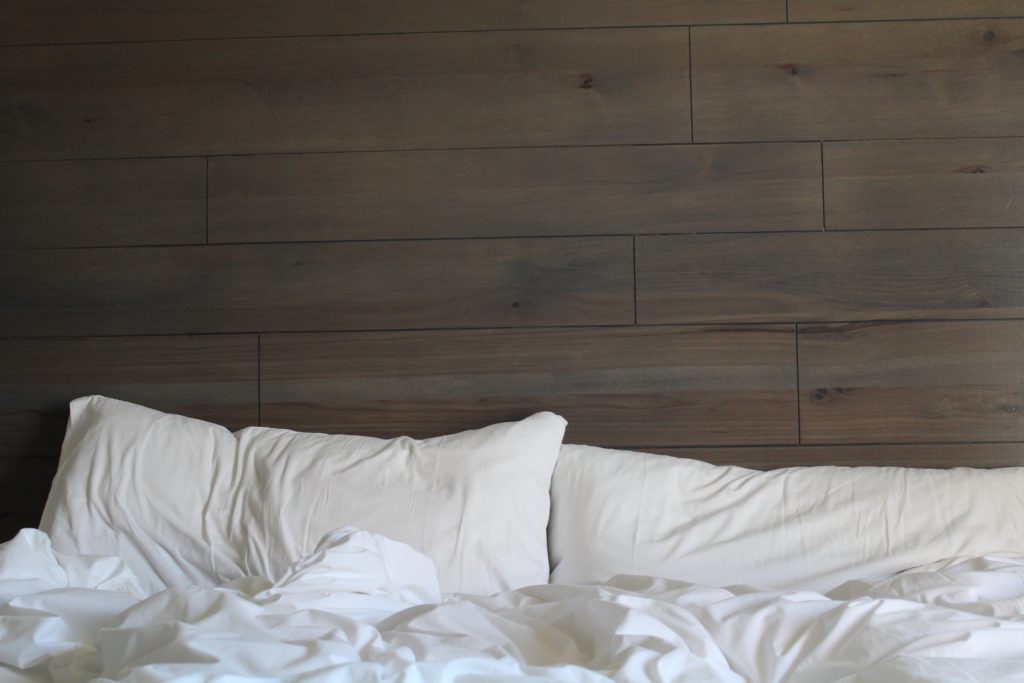
Be honest with yourself. How much sleep are you actually getting each night?
Sleep deprivation is so common in today’s hectic society, that it often gets ignored. Just because it’s so common, doesn’t mean it’s okay.
Sleep deprivation can be destructive to your physical and mental health, resulting in a lower quality of life.
Your health and fitness goals become more difficult to reach.
Stress is more likely to build up and tear you down. You aren’t operating as efficiently as you could be—both physically and mentally.
You simply aren’t the best version of yourself without a great night’s sleep.
According to the National Institutes of Health (NIH), about 1 in 3 American Adults do not get the recommended amount of quality sleep.
The Sleep Foundation has a set of indicators of “quality sleep.” These include:
» Sleeping more while in bed (85 percent of the total time or more).
» Falling asleep in 30 minutes or less.
» Waking up no more than once each night.
» Being awake for 20 minutes or less after initially falling asleep.
Insufficient amounts of quality sleep can:
» Disrupt your hormones.
» Drain your energy levels.
» Increase unhealthy food cravings.
» Pull you away from a positive state of mind and contribute to mood swings.
» Decrease levels of motivation, focus, and mental clarity.
» Make fat loss difficult and weight gain more likely.
» Make increases in muscle mass and strength more challenging.
» Decrease brain function and exercise performance.
» Weaken your immune system.
» Increase your risk of high blood pressure.
» Decrease your sex drive.
Overall, your quality of life just isn’t very good without enough sleep.
Life is better when you’re feeling great, functioning at your best, performing well, thinking clearly, etc.
Your energy levels are higher and you feel great.
You can handle stressful situations constructively.
You can take on a long and demanding day.
You’re thinking more clearly at work and getting more meaningful tasks done.
Your motivation is higher to achieve your goals. You have better workouts and you’re making healthier food choices.
Life is good.
If you’re struggling to fall asleep and stay asleep, I hope that lengthy list of potential negative effects of sleep deprivation is a wake-up call for you.
Check out these tips for getting the quality and restorative sleep you need to be and do your very best.
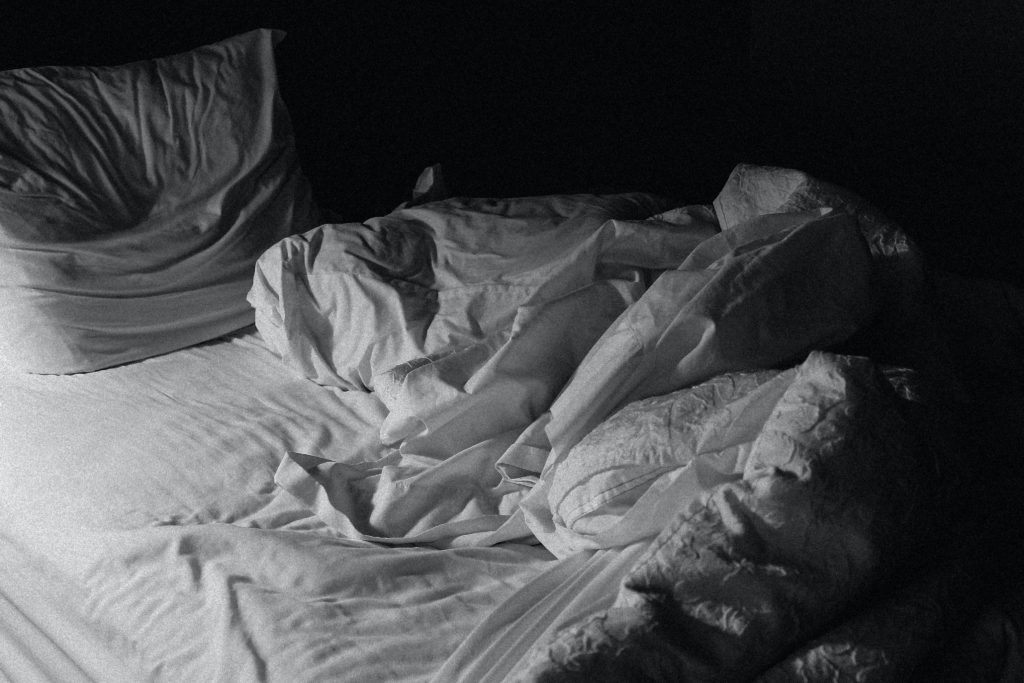
1. Establish a Routine to Unwind and Relax
Establish an evening routine to help you unwind and relax after a busy day.
For some, their evening routine may consist of a warm bath, followed by some tea and reading in bed.
For others it might be journaling, meditating, and planning out the following day. Maybe you decide to foam roll, stretch, then shower.
A pre-bed routine may last anywhere from 30 to 90 minutes. Experiment and go through trial and error.
Find what relaxes you, clears your mind, and allows you to transition into a more restful state in preparation for sleep.
2. Optimize Your Environment For Sleep
Your level of comfort and your surroundings can have a major impact on your quality of sleep.
Double-check your mattress, pillows, and blankets. Are they worn out, causing back, shoulder, and neck discomfort? Are they even comfortable? You may need to try out some different mattresses and pillows to realize just how unpleasant yours are. This could be the reason for your sleep struggles.
Reevaluate your surroundings. Are there noises and light sources that could be avoided? How’s the temperature? Are you consistently waking up too hot or too cold?
Keep your room as dark and quiet as possible. Use black out curtains or use a sleep mask if you need to.
Declutter your room if it’s a total mess. I know, you’re probably wondering how clutter could impact your sleep if it’s dark and you’re lying down, but it does.
Researchers have found a direct correlation between poor sleep quality and high levels of bedroom clutter. You’re probably not even aware of it, but a messy environment affects your brain. Unconsciously, your brain interprets the disorganized room as a task that needs to be completed, making it difficult to relax.
Temperature can impact your ability to sleep as well. According to many sleep experts, the ideal temperature for a good night’s is about 65-degress Fahrenheit. This can vary from person to person, but double-check the temperature of and adjust as needed.
Lastly, try using some noise. Sounds backwards doesn’t it? I just told you to cut out the noise, but not all is bad. White noise, such as the sound produced by a fan, can help some people fall asleep.
White noise can be defined as “noise containing many frequencies with equal intensities.” It can provide a soothing effect while blocking out any irregular and loud enough sounds that may cause you to wake up. If you use a fan, you may need to add an extra blanket to prevent you from getting too cold.
Others prefer to use sounds such as rain. You can down the sound of rain onto your mobile phone or use an app.
Optimize your environment for more quality and restorative sleep. It can play a huge impact on your ability to fall asleep and stay asleep.
3. Place Limits On Naps
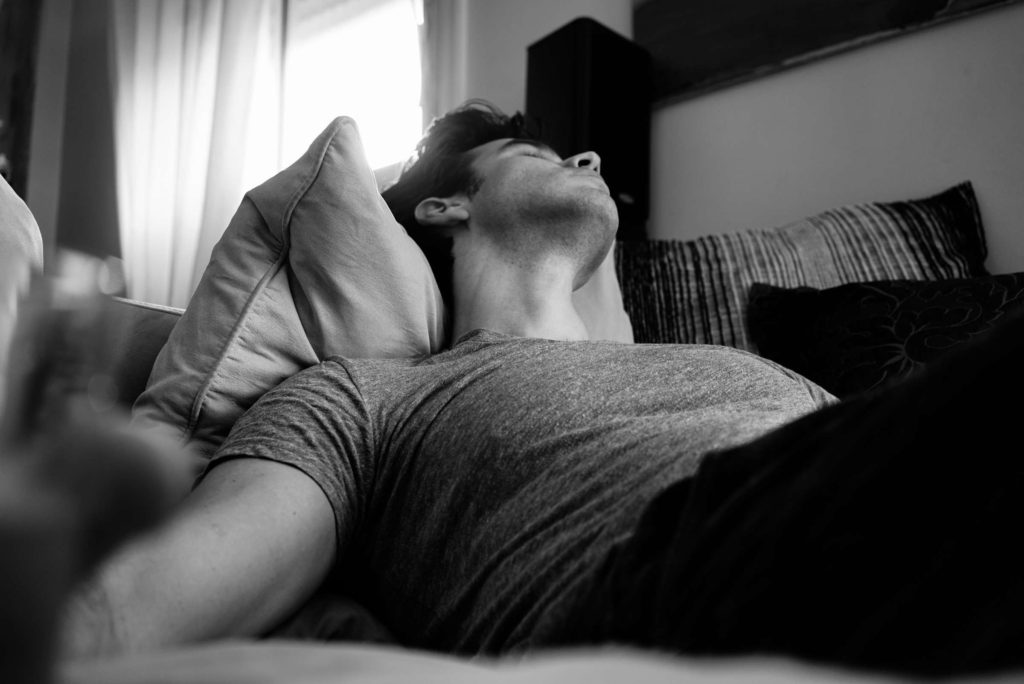
Naps have their place, but done too often for too long and they can disrupt your sleep at night.
The circadian rhythm regulates sleep-wake cycles and is part of your body’s internal clock. The purpose of the circadian rhythm is to ensure your body’s processes are operating as they should at various parts of the day over 24 hours.
Napping throughout the day can throw off your internal clock and make sleeping at night more difficult. Especially later and longer naps.
If you’re going to nap, keep them consistent from day to day. Limit them to 30 minutes or less, and try to take them earlier in the day. You may have to experiment with yourself and find what time of day and how long is optimal for you.
When done right, naps can leave you feeling refreshed and motivated, but still allow you to sleep well at night.
4. Exercise, But Not Too Close to Bedtime
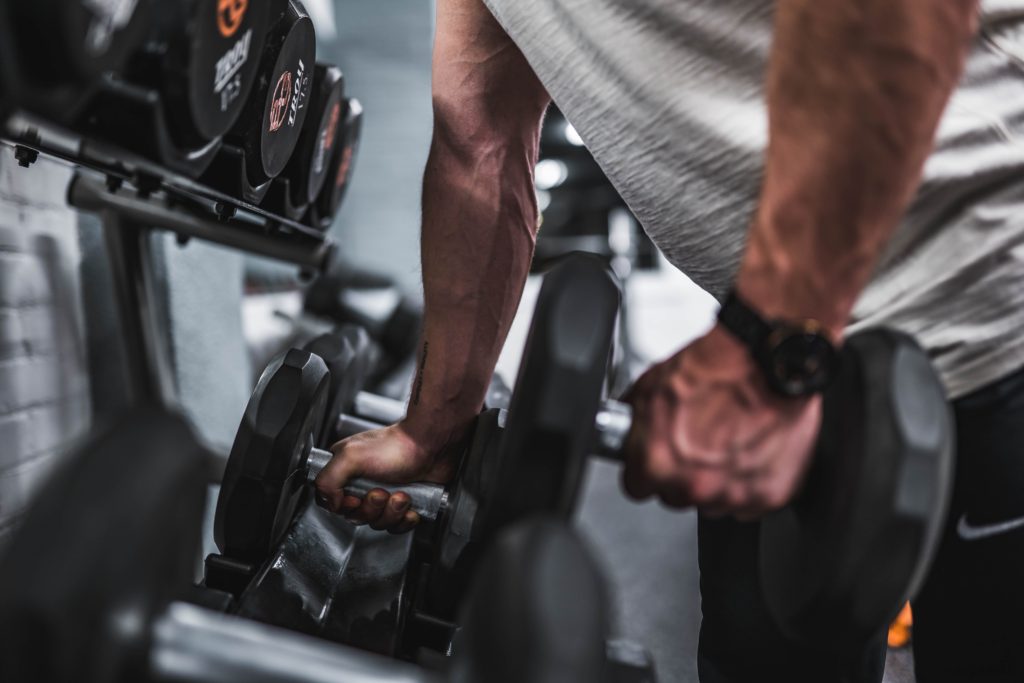
Exercise provides all sorts of awesome health benefits—for both the body and mind. Many studies have repeatedly shown that exercise improves sleep quality, but the physiological mechanism behind it still isn’t completely understood.
Do your best to avoid exercise too close to bed time. A light walk after dinner won’t do any harm, but intense exercise has a stimulatory effect. Hormones such as adrenaline and epinephrine increase, enhancing your level of alertness. This can keep you awake and make falling asleep difficult.
Just like some of the other tips I’ve provided, this will also require some trial and error.
Some people can get home from the gym and fall asleep in 2 hours. Others might need 4 or 5 hours.
Find what works best for you and stick with it.
5. Sleep On a Set Schedule
Try to stay in sync with your body’s natural circadian rhythm—it’s sleep-wake cycle.
Irregular sleeping patterns can throw off your internal clock and levels of melatonin.
Find a bed time that works best for you. A time when you’re actually tired and can easily fall asleep within 20 minutes. If you get the amount of sleep you need, you’ll naturally wake up without an alarm.
You’re aligned with your body’s internal clock when you consistently go to sleep and wake up on a regular schedule.
If you’re not already, start being consistent with your sleep schedule. Yes, even on the weekends when possible.
6. Avoid a Heavy Meal Before Bed

Eating a large meal too close to bed time may make falling asleep a challenge.
A very full stomach and lying horizontally isn’t ideal for digestion or comfort. Not only is this uncomfortable, making sleep difficult, but it can lead to acid reflux.
Try going to the Cheesecake Factory and stuffing your face, then coming home and climbing into bed. Good luck sleeping.
You’ll most likely be too full to get comfortable and fall asleep. Your body is working hard to digest all the food.
Meal timing and meal size for optimizing sleep will vary from person to person.
Find what works for you.
If you’re still very hungry before bed, eat something light like a bowl of yogurt with almonds, a couple of rice cakes with peanut butter, or make a protein shake with a scoop of whey or casein protein with almond milk.
7. Increase Exposure to Light During the Day
Light and dark have a powerful effect on your circadian rhythm. Your internal clock, or circadian rhythm, uses light and dark to regulate your sleep-wake cycle.
Light at the wrong time, such as before bed, can disrupt your internal clock and make falling asleep more difficult.
Light at the right time, such as during the day, can keep your internal clock in sync and make falling asleep and staying asleep much easier.
Get out more during the day. Use your lunch breaks to eat outside or at least walk outside after eating. Open up the blinds and curtains. Take your dog on an extra walk per day to get outside.
8. Reduce Light Exposure in the Evening
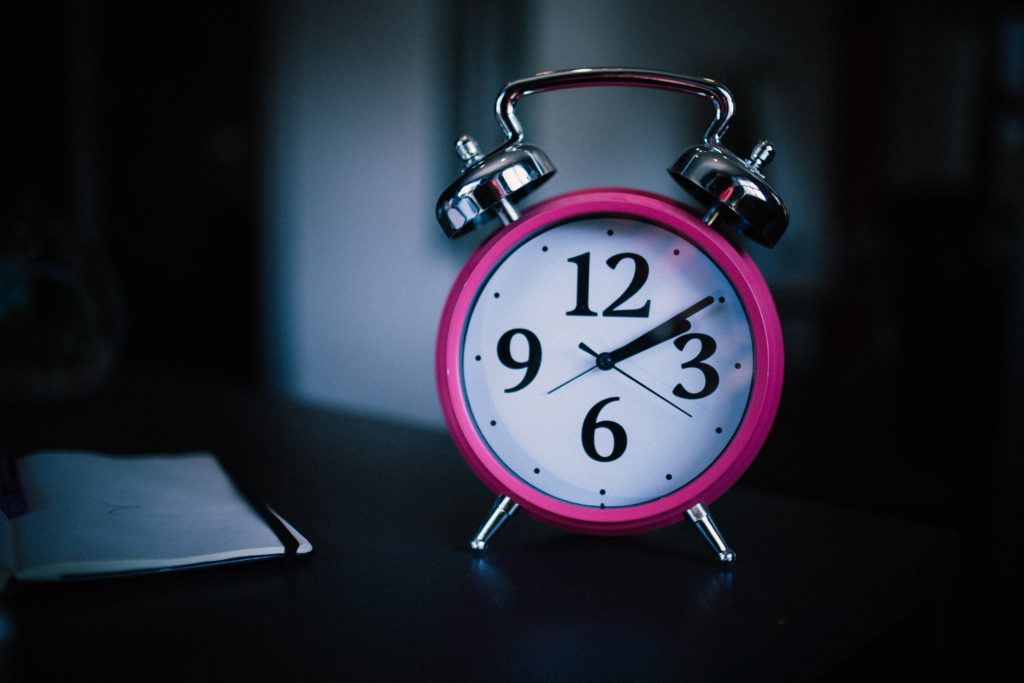
Light exposure during the day is great for getting restful sleep at night, but too much light in the evening can ruin your chances of getting that precious restful sleep.
Light exposure at night can negatively impact your circadian rhythm, basically tricking your body into thinking it’s still daytime and keeping you awake.
Melatonin is the sleep hormone produced by the brain in response to darkness. If you’re overly exposed to light at night, melatonin levels may be suppressed when they should be doing the opposite—rising to promote sleep.
Avoid TV, computers, and phones about 60 to 90 minutes before bed. Most television shows are stimulating instead of relaxing. Computer, phones, and tablets emit blue light which contributes to keeping you awake.
Buy blue light blocking glasses and download f.lux to block blue light from your computer. You can also opt for the hardest, but most effective solution of them all—avoid all artificial light from TV, phones, computers, and tablets about 60 to 90 minutes before bed.
Instead, develop a bed time routine that doesn’t involve electronics. Put the phone away before bed. You won’t miss anything. Catch up on your newsfeed and emails in the morning. It’ll still be there.
9. Clear Your Mind and Manage Your Stress
If you’re constantly stressed, there’s a good chance you’ll have a hard time falling and staying asleep. This can become a harmful cycle if you then become more stressed due to not sleeping, then the lack of sleep further contributing to your stress.
Stress can leave your mind running with negative thoughts. Intrusive thoughts, beliefs, and worries that keep you wide awake. You’re in bed trying to fall asleep, but at the same time you’re worrying about the past and future, never truly present.
Falling asleep isn’t easy if you can’t clear your mind and relax. When you do eventually fall asleep, chances are you’ll wake up and source of stress that’s taking over your thoughts will be the first thing on your mind. It just won’t go away.
Find effective and healthy ways to control your stress before it controls you. You’ll sleep better, feel better, perform better, and life will be better.
Related: “14 Effective Ways To Beat Stress”
10. Keep The Bedroom For Sleep & Sex
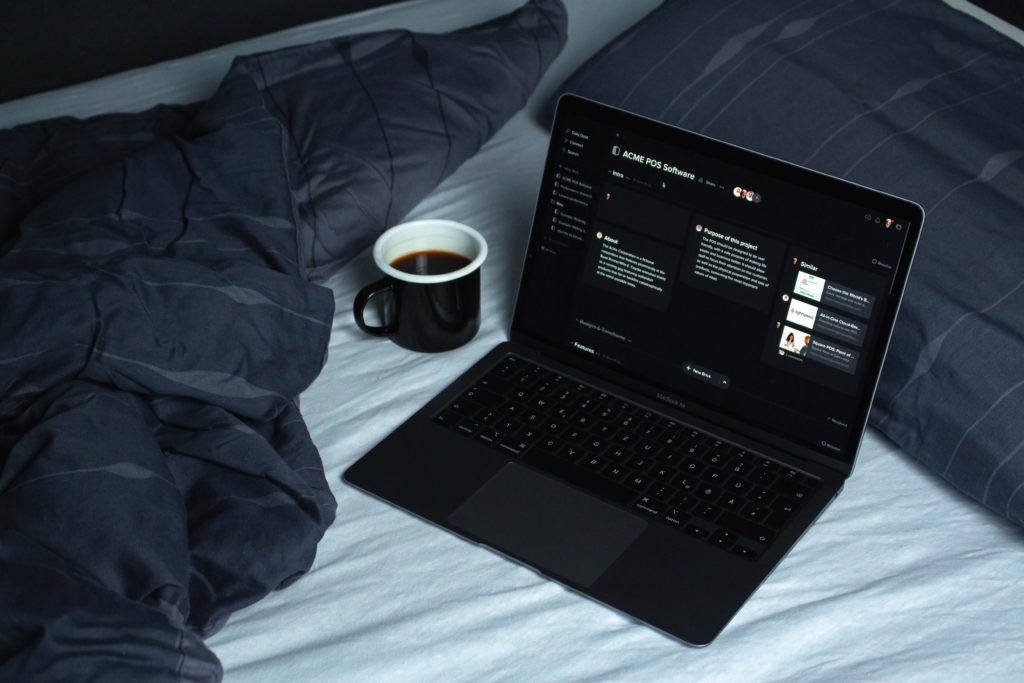
Walking into your bedroom and climbing into your bed should be a signal for your mind and body that it’s time to relax.
It’s not uncommon for people to watch TV for hours in bed, eat in bed, and study and work in bed. Watching TV and getting work done is often stimulating rather than relaxing. You can do all of those things some where else. When you’re in bed, you should be sleeping or sex.
You want to separate your environment for relaxation from your environment for work and other stimulating activities.
11. Avoid Work Too Close to Bedtime

Most forms of work require a good amount of brainpower. You’re focused and more alert. You’re solving problems, designing, creating, and producing ideas.
Some work can be stressful. You have deadlines, unresolved issues, burdensome work to be done, and a stacked to-do list.
If you’re up working late and jump right into bed after checking off the last thing on your to-do list, you’ll probably have a hard time falling asleep. Your mind might be stuck on the work you were just doing. A busy mind isn’t a relaxed mind. Neither is a stressed one.
However, everybody is different and not all forms of work are the same. Some people may work till they’re exhausted. If they’re exhausted, they might be able to easily detach, clear their mind, and fall asleep quickly.
Start your work earlier if possible and be more productive to get more done earlier. If working prior to bed isn’t an issue for you, then go for it. Find what works best for you.
12. Avoid Drinking Liquids Before Bed
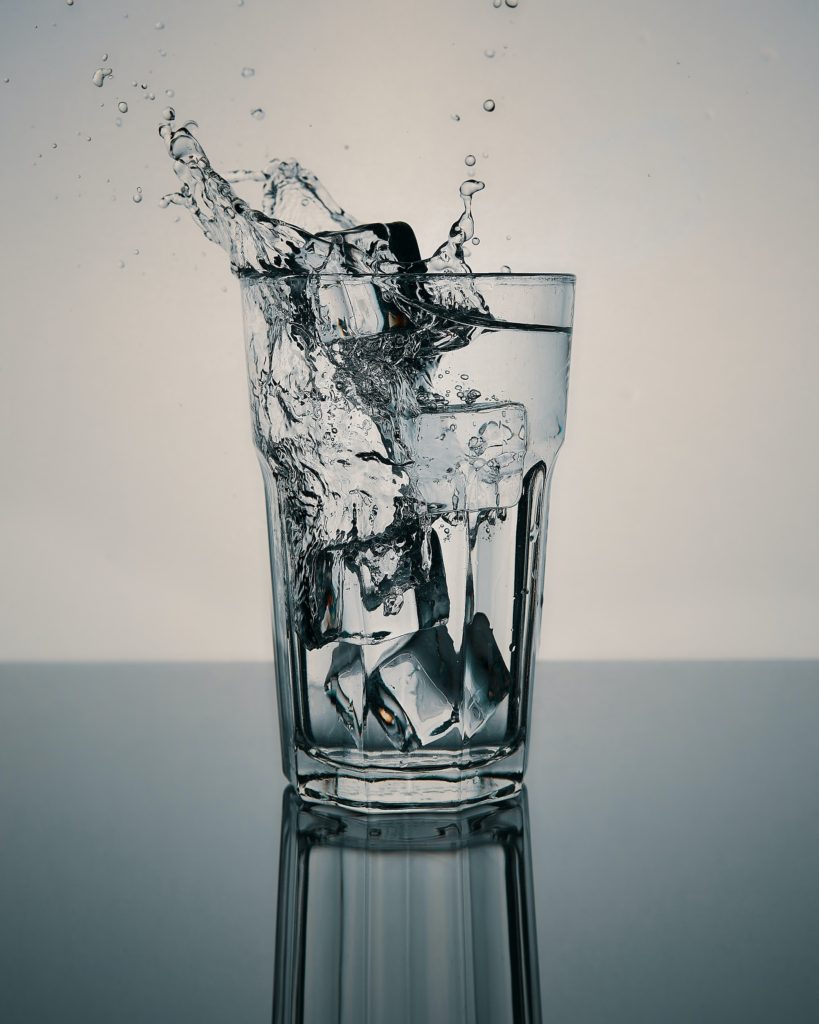
Drinking too much before bed can disrupt your sleep and cause you to wake up in the middle of the night.
This is likely to happen once, which is completely normal. However, if you’re waking up multiple times throughout the night to use the bathroom, you may want to cut back on the amount of liquids (hopefully water and not alcohol or soda) you’re drinking in the evening.
Try to stop all intake of fluids about 1 to 2 hours before bed.
13. Avoid Caffeine and Alcohol Later In The Day

Caffeine makes your more alert, focused, and energized by stimulating your nervous system. If you’re trying to relax and fall asleep, this is the last thing you want. Limit your caffeine intake to the mornings and early afternoon.
Caffeine sensitivity varies quite a lot from person to person, so there’s no set in stone rule as to what specific time of day you should stop consuming caffeine.
Experiment with different levels of caffeine intake at different times of day and see what your body can tolerate.
Alcohol may help you fall asleep quicker due to it’s sedative effects, but it also negatively impacts the REM (rapid eye movement) stage of sleep.
Your body goes through four different stages of sleep. Each stage lasts a certain period of time and serves a beneficial purpose.
As alcohol gets metabolized, it’s sedative effects begin to fade away. This can cause awakenings throughout the night. Some are very minor awakenings you don’t even remember, and sometimes it results in a full awakening. Sleep stages along with your sleep-wake cycle can be disrupted.
Even though you may fall asleep quickly, your quality of sleep will likely suffer as sleep stages get cut short. You probably won’t sleep throughout the night and won’t sleep as long.
Lastly, alcohol also reduces the amount of melatonin produced by your body. This is the hormone responsible for preparing the body for sleep.
Just like caffeine, alcohol tolerance varies from person to person. One to two standard drinks a few hours before bed probably won’t impact your sleep. Find what your body can tolerate.
14. Consider Supplements
There many supplements you can take that could potentially help you sleep better and longer. I’d suggest trying only one, no more than two at a time. Do more of your own research for whichever one you choose to see if it’s okay for you to take and if there are any potential side effects you should be aware of. Especially if you’re taking any medications.
✓ Melatonin
✓ Valerian root
✓ Magnesium
✓ Glycine
✓ Lavender
✓ Passionflower
✓ Tryptophan
✓ Ginkgo biloba
✓ L-theanine
✓ Jujube
✓ 5-HTP
✓ Magnolia bark
15. See a Healthcare Provider
If all else fails, see a healthcare provider. You may have a sleep disorder, a health condition, or maybe you’re taking a medication that is preventing you from sleeping well.
Start applying these tips today. A lot of these are quite simple. The hard part is being very consistent. Once you start consistently sleeping well, you’ll probably be even more motivated to make the right choices. Choices that’ll increase the likelihood that you regularly get a good night’s sleep. You’ll see how great it feels, and you’ll want to keep it up.
Get more quality and restorative sleep, and watch all areas of your life improve.
